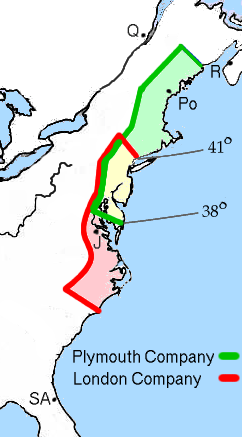Charter of 1606

The 'Charter of 1606', also known as the First Charter of Virginia, is a document from King James I of England to the Virginia Company assigning land rights to colonists for the stated purpose of propagating the Christian religion.[1] The land is described as coastal Virginia and islands near to the coast, but the surveying numbers correspond to modern day South Carolina to Canada. The land itself would remain the property of the King, with the London Company and the Plymouth Company (the two divisions of the Virginia Company) as the King's tenants, and the settlers as subtenants. The colony's government at first consisted of a council residing in London. The document designated the London Company as responsible for financing the project, which included recruiting settlers and providing for their transpor
Purpose of Charter
The charter contains only one statement of purpose, a religious mission: "propagating of Christian religion". King James also intended to spread Christianity to those already living in what was to become the English colonies. "in propagating of Christian Religion to such People, as yet live in Darkness and miserable Ignorance of the true Knowledge and Worship of God, and may in time bring the Infidels and Savages, living in those parts, to human Civility, and to a settled and quiet Government.[1] Some of the Jamestown[2] historians did not believe that the settlers were qualified to govern and achieve the King’s mission of colonization and obtaining access to the orient,[3]
The charter also granted those born in the colonies all the rights of British citizens elsewhere and that they be compensated and protected in case they were robbed or spoiled by anyone.
Management of charter
The King established a council and council member both in America and England to provide governance and management of the colonies and identified all council members. The council had the authority to enjoy the natural resources of the colonies with part of the profits given to the king. "That the said several Councils of and for the said several Colonies, shall and lawfully may, by Virtue hereof, from time to time, without any Interruption of Us, our Heirs or Successors, give and take Order, to dig, mine, and search for all Manner of Mines of Gold, Silver, and Copper, as well within any Part of their said several Colonies, as of the said main Lands on the Backside of the same Colonies; And to HAVE and enjoy the Gold, Silver, and Copper, to be gotten thereof, to the Use and Behoof of the same Colonies, and the Plantations thereof; YIELDING therefore to Us, our Heirs and Successors, the fifth Part only of all the same Gold and Silver, and the fifteenth Part of all the same Copper, so to be gotten or had, as is aforesaid, without any other Manner of Profit or Account, to be given or yielded to Us, our Heirs, or Successors, for or in Respect of the same" [1] The charter also gave authority to council members, to perform regular governance activities as long as they conform to the King’s approval. The king intended to give the colonists all benefits of a government including the right to have their own currency.
Although the colonists had a great deal of freedom, they were subject to the kings’ approval. The following passage states the risk associated with trading without approval. "Moreover, our gracious Will and Pleasure is, and we do, by these Presents, for Us, our Heirs, and Successors, declare and set forth, that if any Person or Persons, which shall be of any of the said Colonies and Plantations, or any other, which shall trick to the said Colonies and Plantations, or any of them, shall, at any time or times hereafter, transport any Wares, Merchandises, or Commodities, out of any of our Dominions, with a Pretence to land, sell, or otherwise dispose of the same, within any the Limits and Precincts of any of the said Colonies and Plantations, and yet nevertheless, being at Sea, or after he hath landed the same within any of the said Colonies and Plantations, shall carry the same into any other Foreign Country, with a Purpose there to sell or dispose of the same, without the Licence of Us, our Heirs, and Successors, in that Behalf first had and obtained; That then, all the Goods and Chattels of such Person or Persons, so offending and transporting together with the said Ship or Vessel, wherein such Transportation was made, shall be forfeited to Us, our Heirs, and Successors." [1]
The charter concluded with a final agreement of the king to authorize the stated colonists to practice their duties as outlined in the paragraphs above.
See also
| Wikisource has original text related to this article: |
Notes
- History of Jamestown. AVPA Preservation Virginia.
- The First Charter of Virginia; April 10, 1606. Yale University Project "1996-2007 The Avalon Project at Yale Law School".
References
- 1 2 3 4 King James I (1606), The First Charter of Virginia, retrieved 2009-10-28
- ↑ Charter of 1606 at Wikisource.
- ↑ History of Jamestown. AVPA Preservation Virginia.